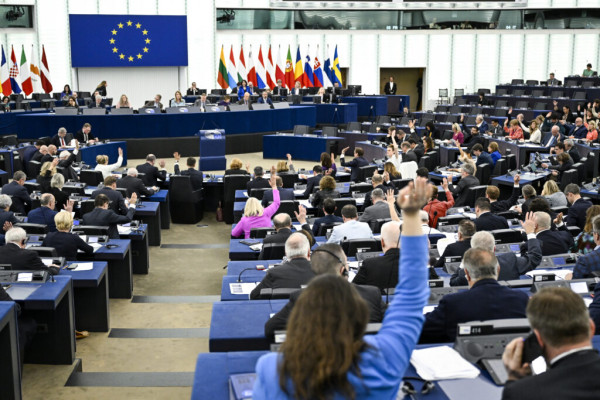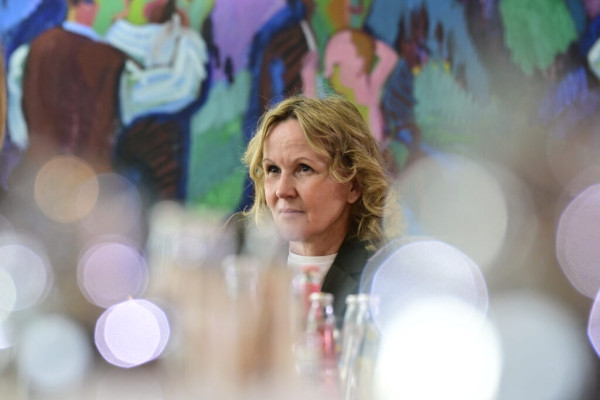The EU compromise machine is breaking — and everyone’s blaming Germany
EU policymaking is going off the rails as the election nears.
The main culprit? Germany’s partisan feuds.
From the outside, Brussels’ lawmaking can seem overly procedural and institutionalized. But in recent weeks, drama has riven the EU institutions, with capitals unexpectedly challenging several deals — thought to be settled — at the last minute. And Berlin’s at the center of it all.
Germany is run by a three-party coalition — the center-left Social Democrats, the Greens and the business-friendly Free Democrats. The trio is frequently at odds over everything from military aid for Ukraine, to boosting the economy and curbing soaring energy prices.
The domestic fighting is now increasingly hijacking Brussels. Berlin’s government has had to stall or spike deals at the last minute after failing to maintain a single stance on key agreements — despite previously helping negotiate them. And the Free Democratic Party (FDP), the coalition’s smallest party, is often the one playing spoiler, searching for a political jolt as it slides toward polling irrelevance.
The FDP’s initial pushback to the EU's nature restoration rules opened the door for late opposition from other countries that froze the legislation — even as the FDP eventually came around. The party also forced Berlin into an 11th-hour abstention on corporate supply chain requirements.
EUROPEAN PARLIAMENT ELECTION POLL OF POLLS
All 3 Years 2 Years 1 Year 6 MonthsSmooth Kalman
For more polling data from across Europe visit POLITICO Poll of Polls.
Disputing deals between EU institutions at the final step of the legislative process, when ministers typically rubber stamp an agreement, is highly unusual — breaching long-standing EU norms.
The deadlock on the nature restoration law “raises serious questions about the consistency and stability of the EU decision-making process,” EU Environment Commissioner Virginijus Sinkevičius said Monday after environment ministers couldn’t adopt the rules. “Backtracking now, after we found the most flexible agreement possible and addressed all your concerns — it’s very difficult for me to accept.”
If those norms no longer apply, there are concerns about what it means for the EU’s Green Deal, which has borne the brunt of the goalline objections, and the future of EU lawmaking after this June’s election. The EU has long relied on creating consensus among disparate political families and major institutions — and then sticking to those agreements once they’re reached.
“For years, in this Parliament, we had a way of working together where, if we shook hands … on a political agreement, then the rest was a formality,” European Parliament member Lara Wolters, a Dutch member of the Socialists & Democrats who led Parliament’s work on the supply chain rules, said earlier this month.
“Clearly, over the last months, that is no longer the case,” she added. “And countries and systems that we depended on, that we saw as good practice, are no longer as stable as they should be.”
Going rogue
The FDP — which has a history of pushing a pro-business agenda during its occasional spells in government — is striving to stay relevant ahead of the EU and German regional elections this year, as well as a general election next year.
The party, which scored around 5 percent or less in all of last year’s German regional elections, is on the brink of political oblivion. POLITICO’s Poll of Polls shows it with just 5 percent support nationally — hovering around the threshold needed to win seats in the Bundestag, and far away from its coalition partners, which themselves have lost support.

Yet these efforts are what left Wolters, the Dutch MEP, grumbling.
She had helped steer the supply chain rules through two years of thorny talks between the EU’s three main institutions — the Parliament, the Council of the EU, which represents EU capitals, and the executive European Commission. And by last December, negotiators thought they had a deal.
Then the FDP waded in, spearheading a push to bury the measure over industry concerns the rules would be too difficult and costly to implement — despite Germany already having its own supply chain oversight rules.
It took several weeks of horse trading — and major concessions to skeptical countries — to get the legislation over the finish line. But Germany continued to abstain, unable to get the FDP on board.
Ultimately, the measure moved through without Germany’s support.
Days later, the FDP took on another target: new rules to rehab Europe’s degraded rivers, forests and seas. Party members in Berlin argued that the bill was no longer welcome as farmers clogged Europe’s capitals to protest mounting environmental rules.
The legislation, which once appeared on course to pass, is now headed toward an election black hole.
The FDP previously flummoxed officials with its successful push to inject a loophole in the EU's 2035 ban on new traditional car sales — protecting Germany’s powerful auto industry.
But the objections are escalating, according to their negotiating partners — with ramifications for the entire EU process.
“It only became a pattern in recent months, particularly on the Green New Deal,” said Irish Environment Minister Eamon Ryan. “If we begin to say in the Council we changed our mind — we agreed with the Commission, the Parliament but now we think differently — how would any future trilogue negotiation have any confidence?”
The 'German vote'
Berlin’s abstentions have a deep tradition in Brussels. It first came to be known as the “German vote” under Angela Merkel’s coalition between the Social Democrats (SPD) and the Christian Democratic Union (CDU).
Oliver Treib, a professor at Münster University, called Germany’s approach a “structural” problem, arguing that since coalition partners “coordinate poorly,” disagreements often only surface at the final moment.

What’s new is the frequency of abstentions late in the legislative process, he added.
German Federal Environment Minister Steffi Lemke admitted that agreeing on the nature restoration law "has become more difficult because we, as the German government, also had difficulties in putting the German vote clearly on the table at the right time."
Germany’s recent abstentions weaken its standing in Brussels, said Thu Nguyen, deputy director of the Jacques Delors Center in Berlin, a think tank: “Germany is no longer seen as a reliable negotiation partner because, at the last minute, they are going to change their vote.”
That makes it difficult for negotiators to find strong majorities on certain files, considering Germany represents almost 19 percent of the EU population. To pass, most EU laws need a so-called qualified majority of countries representing at least 65 percent of the EU’s population.
The concern is that other governments will follow Germany’s lead, Nguyen noted. “If it spreads in other member states, I think it would become very problematic,” she said.
The nature restoration law may become a prime example. The legislation hangs by a thread after Hungary, which initially backed the text, switched its stance last week — putting a near-fatal knife in the bill.
Outrage
In Brussels, Berlin isn’t making friends with the practice.
“Within the span of a few weeks, the German government has managed to waste away the reputation for reliability and predictability they built over the course of decades,” said one EU diplomat, granted anonymity to speak candidly, during the negotiations on the supply chain rules.
A second EU diplomat said Germany is currently “as unpredictable as its national politics.”
But to Brussels’ liberal German lawmakers, challenging already done deals is legitimate in the current political climate.
“Those who negotiate, they work with what they have, but they just did those negotiations without taking into account this new political reality, which is the war in Ukraine, which needs us to adapt our policies,” said MEP Jan-Christoph Oetjen, an FDP member. “That’s why I think there’s a challenge of those results because they are not reflecting reality anymore.”
FDP leader Christian Lindner, Germany’s finance minister, blasted the criticism as a media creation.
“If you don't accept all the red-green offers,” he said, referencing the SPD and Green party colors, “you are the blocker in the media.”
Conservatives eye elections, too
Over in the European Parliament, conservative politicians are also imitating the Free Democrats, driving last-minute campaigns to spike near-settled legislation.
And, coincidentally, the Germans are also heavily involved.
The center-right European People’s Party group, Parliament’s largest, has (unsuccessfully) staged last-minute crusades to dramatically amend both the contentious nature restoration rules and stricter pollution limits for major industrial sites, including livestock farms.
The group has a distinct German flavor — its leader is German Manfred Weber and its base includes a large contingent of German conservatives.
But unlike the FDP, which is vying to remain relevant in national politics, the EPP is making rhetorical appeals to discontented farmers and rural voters with an eye on the EU election in June. The EPP is currently leading in the polls, but facing an ascendant far-right also trying to capitalize on the farmer protests and anti-green anger.
But the EPP’s actions have fractured its own ranks.
Radan Kanev, an EPP member who led Parliament’s work on the industrial emissions rules, criticized his political family for trying to amend his hard-won deal.
It’s a matter of “political credibility,” he argued.
Julia Wacket and Hans von der Burchard contributed reporting from Berlin.
Don’t miss out on the political event of the year! POLITICO and Studio Europa Maastricht are joining forces to present the highly anticipated Maastricht Debate. From your screen to the ballot box, take part in democracy by registering here to join us online.